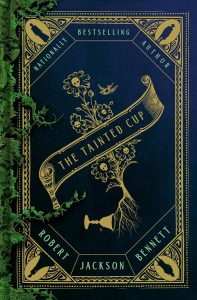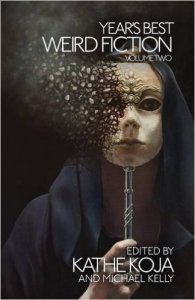Jake Casella Brookins Reviews The Tainted Cup by Robert Jackson Bennett
 The Tainted Cup, Robert Jackson Bennett (Del Rey 978-1-9848-2070-9, $28.99, 432pp, hc) February 2023.
The Tainted Cup, Robert Jackson Bennett (Del Rey 978-1-9848-2070-9, $28.99, 432pp, hc) February 2023.
Robert Jackson Bennett’s previous fantasy works – The Divine Cities and Founders trilogies – were immensely and somewhat unexpectedly delightful for me. I don’t often seek out fantasy series anymore. So, when I encounter an author who writes the kind of fun, propulsive work that kept my teenage self scouring the shelves for the next installment, I keep them on my radar. Bennett’s newest, The Tainted Cup, absolutely rewards that attention: cleverly drawn characters and plots, a fascinating world with fantastic mechanics, and it manages to wrap up its narrative satisfyingly while leaving the door open for more.
The novel is primarily structured as a detective story, with some recognizable but thankfully not-overdone Sherlock Holmes analogs. Our protagonist, Dinos Kol, has been assigned as an assistant to the esoteric and supremely talented investigator Ana Dolabra. Their first case together is a very strange murder: an engineer found impaled on trees that apparently grew from within his own body. As the case progresses, it grows ever-more convoluted, bringing in government corruption, revenge for old atrocities, and touching on Din’s own secrets.
Bennett has a real knack for setting up interesting characters, and what really shines here is how compellingly he’s crafted the mystery. There are enough clues and feints to keep the reader guessing throughout, with a superb balance of surprises and deducible reveals. And, of course, the whole plot unfolds in a fantastically weird and inventive secondary world.
Din and Ana work for the Empire of Khanum, a society that revolves around repelling the incursions of monstrous leviathans. While the empire evokes Rome or other classic hegemonies – there’s a lot of quasi-Latinate signifiers in the terminology – it’s these monsters, not human enemies, that occupy their military attention, and their civilization is built around a series of vast defensive structures. Although I don’t normally use the term positively when talking about books, there’s something distinctly and delightfully cinematic about Bennett’s writing. He’s adroit at concisely setting up characters, vividly painting backgrounds, and then using them for eyeball-kicking action sequences, whether that’s Din falling back on his sword training when set upon by assassins, or the entire surrounding military springing into action as a mountain-sized beast lumbers towards them.
More fascinating than the walls, cannons, and monsters, however, are the technologies of the empire: This is a thoroughly nonmagical fantasy, with all manner of exotic effects achieved through biological augmentation. Din, for instance, has been modified to be an ‘‘engraver,’’ capable of total eidetic recall with the aid of scent cues. Other people have been modified for strength, speed, and a variety of mental abilities, and animals and plants are also routinely augmented. How Bennett handles all this is really quite fun: never quite saying either ‘‘genetic engineering’’ or ‘‘alchemy.’’ Within the familiar frames of a detective story and a historically inspired empire, it’s a constant source of strangeness and wonder. Furthermore, in Bennett’s construction of the abilities and sensitivities of his mentally augmented characters, there’s some quite good consideration of neurodivergence and accessibility; part of Ana’s charm is her mix of genius and varying sensory needs.
While Din is very focused on his own case and its complications, I found myself increasingly pondering the larger world here. While the basic setup of leviathan defense evokes nothing so much as that one shot of a kaiju breaching the wall in del Toro’s Pacific Rim, the way this threat has shaped Din’s society strongly recalls Isayama’s Attack on Titan, in which a beleaguered and militarized society battles anthropophagic giants. As in Attack on Titan, the empire of The Tainted Cup has directed itself almost entirely towards this threat; the moral significance of Din’s case is less the individual victims than it is how the crimes might weaken the empire’s defenses in short or long-term. So, behind the fun (if bloody) murder mystery, there’s something much larger: a society that has defined itself entirely in terms of an external threat, and adjusted its moral and legal schemes accordingly. More frightening than the leviathans, when one stops to think about it, and, in the motivations of many of the criminals Din and Ana pursue, there are hints of what this totalitarian focus has done to the fabric of their society.
Those leviathans point the way towards what’s still to come in the series: one can hardly spend an entire novel trying to figure out Din’s human-scale mysteries and fail to notice the literally earthshaking nonhuman mysteries looming above it all. There’s clearly much more to unravel here, but I find that’s all the more welcome for how neatly The Tainted Cup wraps up, with Din and Ana sharing a moment of decidedly Watson-and-Holmes-esque banter as they head back, deeper behind the walls.
Jake Casella Brookins is from the Pennsylvania Appalachians, and spent a fantastic amount of time in the woods. He studied biology, before switching over to philosophy & literature, at Mansfield University. He’s been a specialty coffee professional since 2006. He’s worn a lot of coffee hats. He worked in Upstate New York and Ontario for about 8 years. He’s been in Chicago since 2013; prior to the pandemic, he worked for Intelligentsia Coffee in the Loop. Starting in 2021, he’s been selling books at a local indie bookstore. He lives with his wife, Alison, and their dogs Tiptree & Jo, in Logan Square.
This review and more like it in the March 2024 issue of Locus.
 While you are here, please take a moment to support Locus with a one-time or recurring donation. We rely on reader donations to keep the magazine and site going, and would like to keep the site paywall free, but WE NEED YOUR FINANCIAL SUPPORT to continue quality coverage of the science fiction and fantasy field.
While you are here, please take a moment to support Locus with a one-time or recurring donation. We rely on reader donations to keep the magazine and site going, and would like to keep the site paywall free, but WE NEED YOUR FINANCIAL SUPPORT to continue quality coverage of the science fiction and fantasy field.
©Locus Magazine. Copyrighted material may not be republished without permission of LSFF.






